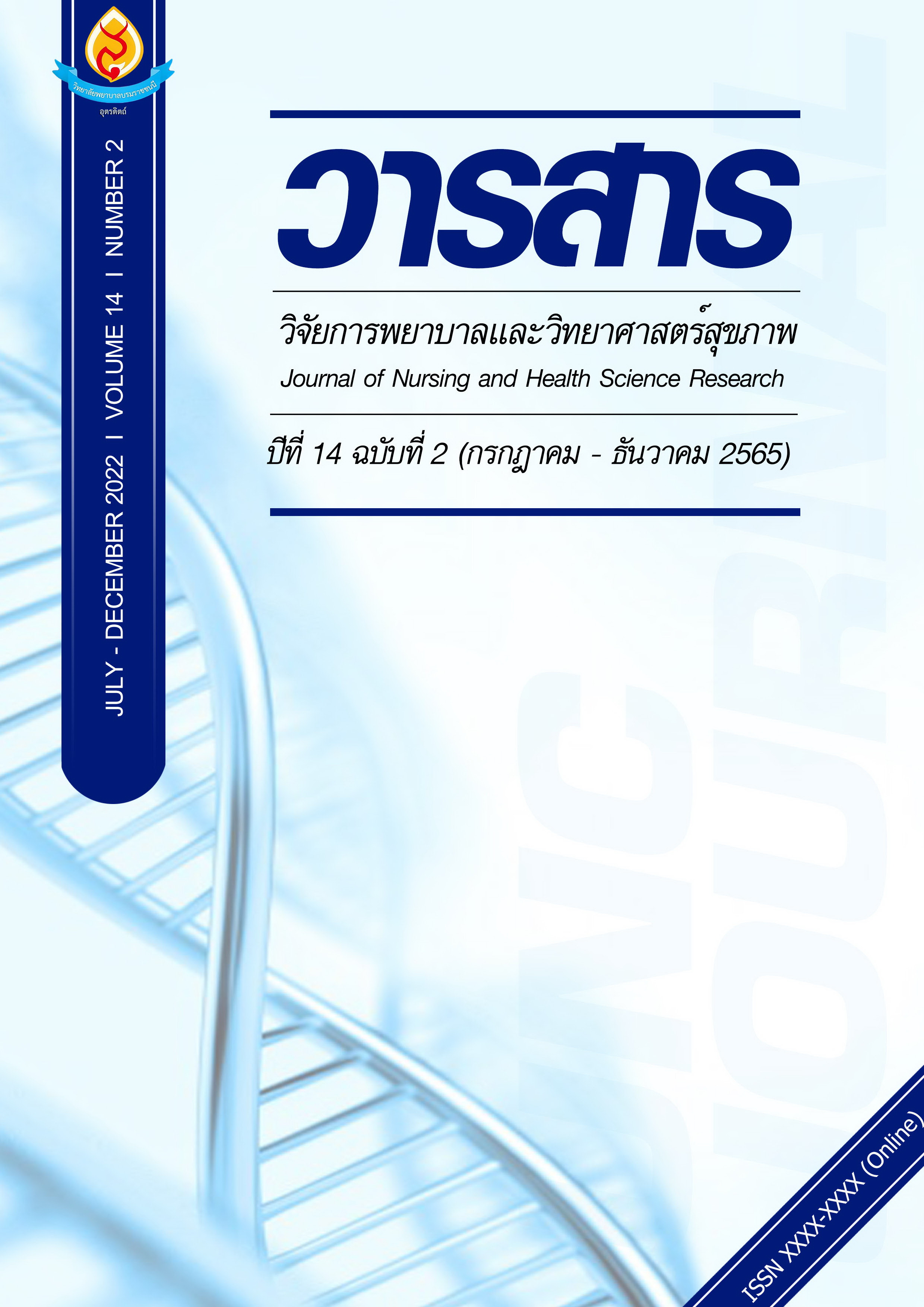ผลของโปรแกรมการจัดการรายกรณีผู้สูงอายุโรคความดันโลหิตสูงที่มีภาวะไตเรื้อรัง ในสถานบริการระดับปฐมภูมิ
Main Article Content
บทคัดย่อ
การวิจัยครั้งนี้เป็นวิจัยกึ่งทดลอง (Quasi - Experimental Research) แบบศึกษาสองกลุ่ม วัดผลก่อนและหลังการได้รับโปรแกรมการทดลอง (Two Group Pretest-Posttest Design) มีวัตถุประสงค์เพื่อศึกษาผลของโปรแกรมการจัดการรายกรณีต่อพฤติกรรมการดูแลตนเองและระดับความดันโลหิต กลุ่มตัวอย่างเป็นผู้สูงอายุตั้งแต่ 60 ปีขึ้นไป ป่วยความดันโลหิตสูงที่มีภาวะไตเรื้อรังระยะที่ 3 ตรวจพบโปรตีนในปัสสาวะตั้งแต่ 1+ ขึ้นไป แบ่งเป็นกลุ่มทดลองและกลุ่มควบคุม โดยวิธีการคัดเลือกแบบเฉพาะเจาะจง (Purposive sampling) กลุ่มละ 30 คน ระยะเวลา 8 สัปดาห์ กลุ่มทดลองดำเนินการตามรูปแบบของโปรแกรมการจัดการรายกรณี และวัดระดับความดันโลหิต สัปดาห์ละ 1 ครั้ง กลุ่มควบคุมได้รับการพยาบาลตามปกติ เครื่องมือที่ใช้ในการวิจัย ประกอบด้วย 1) โปรแกรมการจัดการรายกรณี 2) แบบสอบถามพฤติกรรมการดูแลตนเอง 3) เครื่องวัดความดันโลหิต วิเคราะห์ข้อมูลด้วยสถิติ ค่าเฉลี่ย ร้อยละ ส่วนเบี่ยงเบนมาตรฐาน Chi-square, Paired t-test และ Independent t test
ผลการวิจัยพบว่า 1) กลุ่มทดลองที่ได้รับโปรแกรมการจัดการรายกรณีมีคะแนนเฉลี่ยพฤติกรรมการดูแลตนเองสูงกว่าก่อนการทดลองอย่างมีนัยสำคัญทางสถิติที่ระดับ .001 2) กลุ่มทดลองที่ได้รับโปรแกรมการจัดการรายกรณีมีค่าระดับความดันโลหิตต่ำกว่าก่อนการทดลองอย่างมีนัยสำคัญทางสถิติที่ระดับ .001 3) กลุ่มทดลองที่ได้รับโปรแกรมการจัดการรายกรณีมีคะแนนเฉลี่ยพฤติกรรมการดูแลตนเองสูงกว่ากลุ่มควบคุมอย่าง มีนัยสำคัญทางสถิติที่ระดับ .001 4) กลุ่มทดลองมีระดับความดันโลหิต Systolic ต่ำกว่ากลุ่มควบคุมอย่าง มีนัยสำคัญทางสถิติที่ระดับ .001
การวิจัยครั้งนี้สรุปได้ว่า การจัดการรายกรณีผู้สูงอายุโรคความดันโลหิตสูงมีผลต่อการปรับเปลี่ยนพฤติกรรมการดูแลตนเองและการควบคุมความดันโลหิตเพื่อชะลอความเสื่อมของไตได้ดีขึ้น สามารถนำไปประยุกต์และพัฒนาการดูแลผู้ป่วยโรคความดันโลหิตสูงให้มีประสิทธิภาพมากยิ่งขึ้น
Article Details

อนุญาตภายใต้เงื่อนไข Creative Commons Attribution-NonCommercial-NoDerivatives 4.0 International License.
บทความหรือข้อคิดเห็นใดใดที่ปรากฏในวารสารวิจัยการพยาบาลและวิทยาศาสตร์สุขภาพ เป็นวรรณกรรมของผู้เขียน ซึ่งบรรณาธิการหรือสมาคมศิษย์เก่า ไม่จำเป็นต้องเห็นด้วย และบทความที่ได้รับการตีพิมพ์เผยแพร่ถือเป็นลิขสิทธิ์ของวารสารวิจัยการพยาบาลและวิทยาศาสตร์สุขภาพ
เอกสารอ้างอิง
Aekplakorn, W. (2014). The 5th Thai health survey by physical exam 2014. Nonthaburi: Health Systems Research Institute.
Boonjun, N., Aucharat, P., Punsuk, W. & Meehadsai, N. (2011). The effect of self-care development of the elderly with high blood pressure. Journal of Nursing, 29(2), 93-102.
Case Management Society of America. (2010). Standards of practice for case management. Little Rock, AR.
Jewpattanakul, Y. (2012). Family supports for the elderly during the Arm Swing Exercise. Journal of The Royal Thai Army Nurses, 12(2), 1-7. (in Thai).
Karaket, A. & Methakanjanasak, N. (2017). Effects of a nurse case management intervention on selected outcomes among patient with type II diabetes mellitus experiencing hypoglycemia at emergency department. Journal of Nursing and Health Care, 35(1), 119-127. (in Thai).
Khumtaweeporn, P. & Chirathamkun, S. (2016). Health management of elderly with hypertension in the urban community Bangkok. Journal of the Royal Thai Army Nurses, 17(2), 154-162. (in Thai).
Kosoljit, R. & Noimuenwai, P. (2017). The effectiveness of case management in diabetic patients. Pak Phli Hospital Nakhon Nayok Province. Journal of Nursing, 44(1), 26-38. (in Thai).
Maklamdum, P. (2015). The effect of health promotion on self-care behaviors for the elderly patients with hypertension. Phranakhon Rajabhat Research Journal, 10(1). 20-39. (in Thai).
Ministry of Public Health. (2018). Public health statistics A.D.2018. Nonthaburi: Strategy and Planning Division. (in Thai).
Munleun, K., Karnchanasit, W. & Suttipun, N. (2019). The elderly health behavior In Bannongprong district health promotion hospital, amphoe Mueang, Burirum province. The 6th National Conference Nakhonratchasima College 2019. Poster 889-897. (in Thai).
Nakling, Y. & Thatsorn, P. (2017). The effect of self-efficacy promoting program on health behaviors of the elderly with high blood pressure that cannot control blood pressure. Association of Private Higher Education Institutions of Thailand, 6(1), 27-35. (in Thai).
Pragodpol, P. (2017). The study of case management’s competencies and skills of chronic disease nurse case manager. Journal of Phrapokklao Nursing College, 28(1), 14-25. (in Thai).
Ponchaimat, C. & Sangngen, S. (2019). Aimed to study predisposing factors, enabling factors, and reinforcing factors associated with health care behavior of hypertensive patients in the elderly club in bang nok khwaek sub-district, Bang Khonthi, Samut Songkhram. Interdisciplinary Management Journal, 3(1), 65-70. (in Thai).
Ratanasila, R., Amnatsatsue, K., Chansirikan, S., Kunklin, S. & Kerdmongkol, P. (2015). The effect of a case management program for elderly patients with uncontrollable diabetes. Journal of Public Health Nursing, 29(1), 67-79. (in Thai).
Soon-Nyoung, Y. (2014). Effectiveness of community-based case management for patients with hypertension. Journal of Korean Academy of Community Health Nursing, 25(3), 159-169.
Sutornnun, W. (2012). Development of nursing service system by using integrated disease management model and case management concept among patients with hypertension at King Narai hospital contracting unit of primary care, Lop Buri. Thai Journal of Cardio-Thoracic Nursing, 24(1), 96-109. (in Thai).
Thanomboon, T. (2011). The application of orem theory with case management for prevention recurrent hypoglycemia in elderly. Journal of public health nursing, 26(3), 94-105. (in Thai).
Tontiaekrat, S., Makmee, P., Suksanguen, N. & Suttapun, N. (2020). Factors associated with self-care behaviors of the elder with hypertension in Buriram Province by using the precede framework theory. Journal of research and develop Valaya Alongkorn Rajabhut University under the Royal Patronage, 15(1), 59-73. (in Thai).
The Hypertension Association of Thailand. (2015). Guidelines for the treatment of hypertension in general practice. Bangkok: Hua Nam Printing Company. (in Thai).
Tumnumsin, K., Amnatsatsue, K., Kedmongkon P. & Artsuntea, J. (2015). Effects of self-care promoting program on self-care behavior among older adults with uncontrolled hypertension in Bangkok metropolitan. Journal of Public Health Nursing, 29(2), 43-55. (in Thai).


